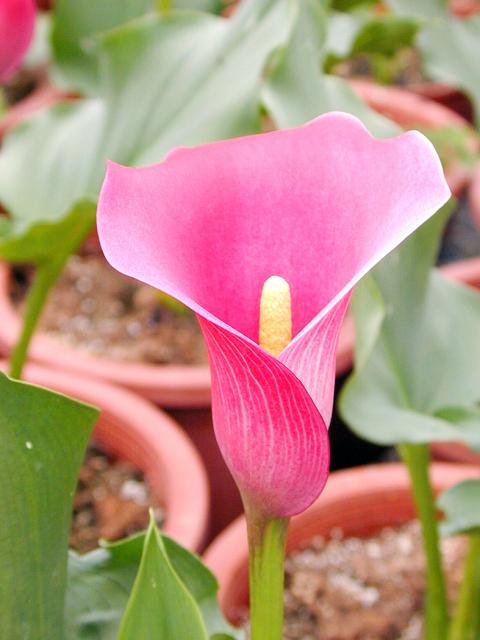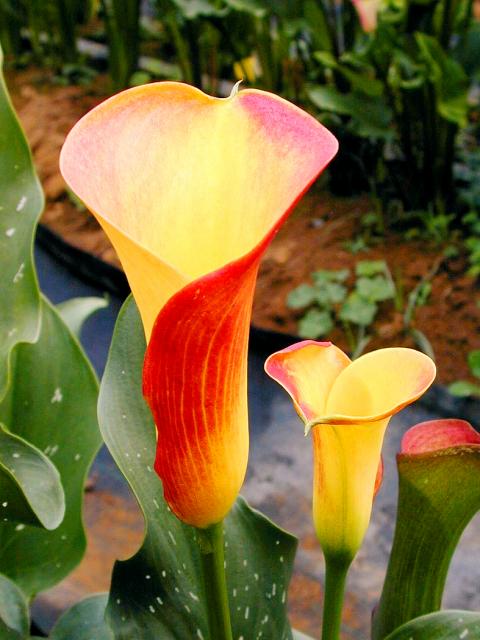After more than 12 years of work, the Council of Agriculture’s Taiwan Seed Improvement and Propagation Station (TSIP) said it has successfully developed two kinds of colored Zantedeschia aethiopica, commonly called the calla lily, that could be grown in Taiwan.
While the usual calla lily is white, one of the new varieties, called Taoji (桃姬), is a deep, vibrant red, and the other, called Xiangjishi (香吉士), is a yellowish-orange. The new lilies are hybrids grown from cross-pollinating Zantedeschia aethiopica from the Netherlands, the US and New Zealand.
The TSIP said it discovered there was a huge market for colored calla lilies when farmers imported the first of its kind into Taiwan in 1986, adding that cut flowers — flowers arranged in vases, bowls, baskets or bouquets — from the calla lily were imported by countries like Japan.

Photo: Chang Jui-chen, Taipei Times, courtesy of the Taiwan Seed Improvement and Propagation Station
However, because the lilies were mostly imported, the overhead costs tended to be high, it said.
TSIP researcher Liu Ming-tsung (劉明宗) said that in 1999, the station started cross-pollination with calla lilies from three other countries to grow a vibrantly colored calla lily that suit Taiwan’s sub-tropical weather.
By 2007, it succeeded in growing the Taoji and Xiangjishi and cataloged the new varieties, Liu said, although during the initial period, there was no mass production of the two kinds of flowers and the station spent another four years growing a few pots that had already flowered, as well as between 2,000 and 3,000 seedlings.

Photo: Chang Jui-chen, Taipei Times, courtesy of the Taiwan Seed Improvement and Propagation Station
“We only began authorizing farmers to start planting once we had enough stock to provide them,” Liu said.
Liu said it would take two or three years for the seedlings to bloom and that the best time for planting was in autumn and winter, adding that if the seedlings were planted in October, they would flower between December and February of the following year.
The flowers can be cut or kept as an indoor potted plant, he added.
Liu said he was excited that the nation’s plains could be covered with a sea of vibrantly colored calla lilies as seen on Yangmingshan’s Zhuzihu (竹子湖), which features an annual Calla Lily Festival at this time of the year.
Translated by Jake Chung, Staff Writer

Three Taiwanese airlines have prohibited passengers from packing Bluetooth earbuds and their charger cases in checked luggage. EVA Air and Uni Air said that Bluetooth earbuds and charger cases are categorized as portable electronic devices, which should be switched off if they are placed in checked luggage based on international aviation safety regulations. They must not be in standby or sleep mode. However, as charging would continue when earbuds are placed in the charger cases, which would contravene international aviation regulations, their cases must be carried as hand luggage, they said. Tigerair Taiwan said that earbud charger cases are equipped

Foreign travelers entering Taiwan on a short layover via Taiwan Taoyuan International Airport are receiving NT$600 gift vouchers from yesterday, the Tourism Administration said, adding that it hopes the incentive would boost tourism consumption at the airport. The program, which allows travelers holding non-Taiwan passports who enter the country during a layover of up to 24 hours to claim a voucher, aims to promote attractions at the airport, the agency said in a statement on Friday. To participate, travelers must sign up on the campaign Web site, the agency said. They can then present their passport and boarding pass for their connecting international

WEATHER Typhoon forming: CWA A tropical depression is expected to form into a typhoon as early as today, the Central Weather Administration (CWA) said yesterday, adding that the storm’s path remains uncertain. Before the weekend, it would move toward the Philippines, the agency said. Some time around Monday next week, it might reach a turning point, either veering north toward waters east of Taiwan or continuing westward across the Philippines, the CWA said. Meanwhile, the eye of Typhoon Kalmaegi was 1,310km south-southeast of Oluanpi (鵝鑾鼻), Taiwan’s southernmost point, as of 2am yesterday, it said. The storm is forecast to move through central

Taiwan sweltered through its hottest October on record, the Central Weather Administration (CWA) said yesterday, the latest in a string of global temperature records. The main island endured its highest average temperature since 1950, CWA forecaster Liu Pei-teng said. Temperatures the world over have soared in recent years as human-induced climate change contributes to ever more erratic weather patterns. Taiwan’s average temperature was 27.381°C as of Thursday, Liu said. Liu said the average could slip 0.1°C by the end of yesterday, but it would still be higher than the previous record of 27.009°C in 2016. "The temperature only started lowering around Oct. 18 or 19